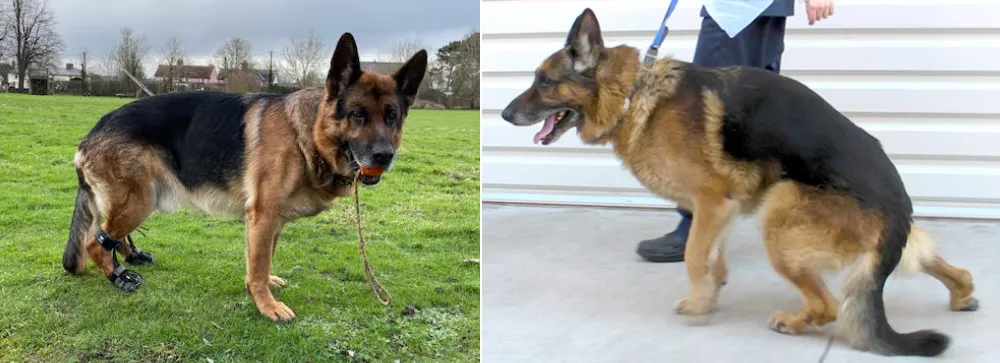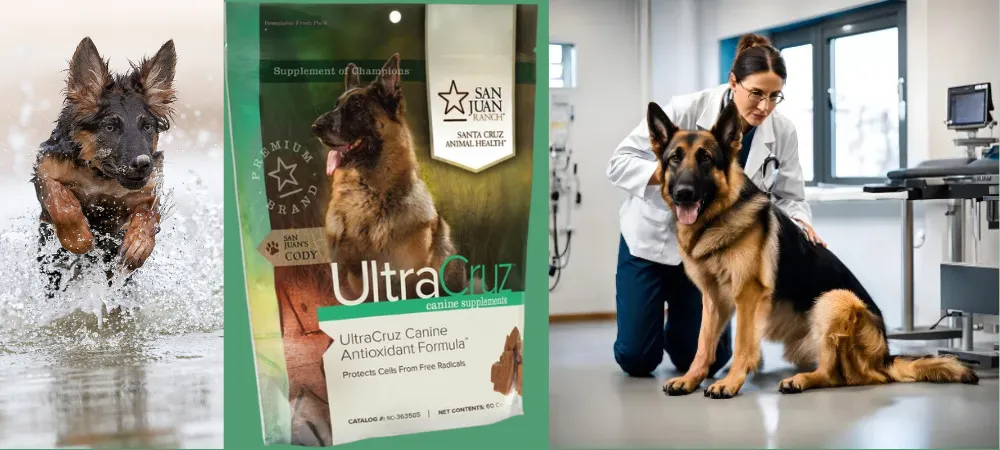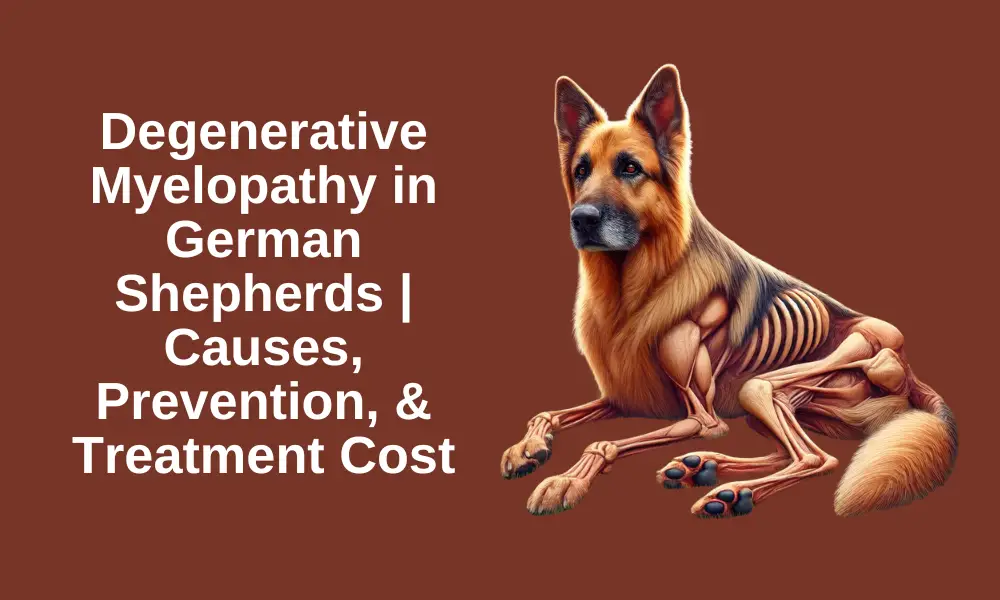Do you want to know what is degenerative myelopathy in dogs, how it affects German Shepherds, its causes, prevention, and treatment costs? You’re in the right place.
Degenerative Myelopathy (DM) is a chronic and progressive neurological condition affecting the spinal cord of dogs, leading to mobility issues and eventual paralysis.
It is caused by the degeneration of myelin, which insulates nerve fibers in the spinal cord. This condition, similar to ALS (amyotrophic lateral sclerosis) in humans, commonly impacts older dogs and is most prevalent in certain breeds due to genetic predispositions.
The following topics will be covered in this post:
- Breeds Most Affected by Degenerative Myelopathy
- At What Age Can Degenerative Myelopathy Occur in German Shepherds?
- Main Causes of Degenerative Myelopathy in German Shepherds
- Symptoms of Degenerative Myelopathy in German Shepherds
- How to Prevent Degenerative Myelopathy in German Shepherds
- Cost of Degenerative Myelopathy Treatment for German Shepherds
RELATED
- Common German Shepherd Health Myths Debunked
- Hip Dysplasia in German Shepherds | Causes & Prevention
- German Shepherd Teeth Problems: Causes, Prevention, Treatment
- Role of German Shepherds in Therapy & Emotional Support
- Training German Shepherds for Families With Young Children
- Is German Shepherd Right for Apartment Living?
- Best Way to Take German Shepherd for Walk: A Complete Guide
- Monthly & Annual Expenses of Owning a German Shepherd
|| DON’T MISS! Today’s Deals on Chewy – Pet Foods, Products, Supplies, Toys, and more. Additionally, visit our Etsy & Online Store for German Shepherd merchandise.
01. Breeds Most Affected by Degenerative Myelopathy
Below is the table containing the list of dog breeds that can be affected by degenerative myelopathy:
| Dog Breed | Likelihood of DM | Average Age of Onset | Estimated Prevalence (%) |
|---|---|---|---|
| German Shepherd | High | 8-14 years | 5–8% |
| Pembroke Welsh Corgi | High | 8-14 years | 4–7% |
| Boxer | High | 8-12 years | 4–6% |
| Chesapeake Bay Retriever | Medium | 8-12 years | 3–5% |
| Siberian Husky | Medium | 8-14 years | 2–4% |
| Rhodesian Ridgeback | Medium | 8-12 years | 2–4% |
| Standard Poodle | Medium | 8-12 years | 2–4% |
| Great Pyrenees | Medium | 8-12 years | 1–3% |
| Bernese Mountain Dog | Medium | 7-10 years | 2–3% |
| Golden Retriever | Low | 8-12 years | 1–2% |
| Labrador Retriever | Low | 8-12 years | 1–2% |
| Irish Setter | Low | 7-11 years | <1% |
02. At What Age Can Degenerative Myelopathy Occur in German Shepherds?
Degenerative myelopathy typically develops in German Shepherds between 8 and 14 years of age.
The disease progresses slowly, often beginning with subtle symptoms like hind limb weakness.

03. Main Causes of Degenerative Myelopathy in German Shepherds
Following are some of the main causes of degenerative myelopathy in German Shepherds:
01. Genetic Mutation (SOD1 Gene)
- Mutation: The primary cause of DM is a mutation in the SOD1 gene (superoxide dismutase 1). This gene is associated with oxidative stress in nerve cells.
- Heredity: DM is inherited in an autosomal recessive pattern means a dog must inherit two copies of the mutated gene (one from each parent) to be at high risk of developing the disease.

02. Oxidative Stress
Oxidative stress in the spinal cord can damage neurons, leading to the progressive degeneration seen in DM.
Oxidative stress occurs when there is an imbalance between the production of reactive oxygen species (ROS) (also called free radicals) and the body’s ability to neutralize or repair the damage caused by them using antioxidants. This imbalance leads to cellular damage, which can contribute to aging, chronic diseases, and various disorders.
Antioxidants are molecules that can prevent damage to cells caused by free radicals, which are unstable molecules produced during normal metabolic processes or from external sources like pollution and radiation. Common antioxidants are Vitamin C, Vitamin E, Beta-Carotene, and Flavonoids.
03. Immune-Mediated Factors
DM may involve immune-mediated mechanisms where the body’s immune system mistakenly attacks the nervous tissue.
04. Environmental Factors (Potential Contributing Role)
Although DM is primarily genetic, environmental factors such as lack of exercise, obesity, or poor diet could exacerbate the condition or hasten its progression.
04. Symptoms of Degenerative Myelopathy in German Shepherds
Recognizing DM early is crucial for managing its progression.
Early Signs
Below are some of the early signs of degenerative myelopathy in German Shepherds:
- Hind limb weakness or wobbliness
- Scuffing of paws when walking
- Difficulty rising or navigating stairs
Progressive Symptoms
Below are some of the progressive symptoms of degenerative myelopathy in German Shepherds:
- Muscle atrophy (decrease in size or wasting away of a body part or tissue) in the hind limbs
- Loss of coordination (ataxia)
- Incontinence (bowel and bladder)
- Paralysis in hind limbs and eventual involvement of the front limbs

A DNA test for the SOD1 mutation can help determine whether a dog is at risk.
05. How to Prevent Degenerative Myelopathy in German Shepherds
While DM cannot be entirely prevented, early intervention and proper care can delay its onset or progression:
- Before breeding, test for the SOD1 mutation to avoid producing at-risk puppies.
- Feed a diet rich in antioxidants (e.g., vitamins E and C) and omega-3 fatty acids to reduce oxidative stress.
- Engage dogs in low-impact activities like swimming or walking to maintain muscle strength and mobility.
- Do regular vet check-ups for early detection of symptoms which can lead to timely management.

06. Cost of Degenerative Myelopathy Treatment for German Shepherds
Although there is no cure for DM, the focus is on supportive care to maintain the dog’s quality of life.
The costs include:
- Physical Therapy: $50–$100 per session (e.g., hydrotherapy, acupuncture).
- Mobility Aids: $100–$400 for harnesses or custom wheelchairs.
Medications and Supplements:
- Antioxidants and anti-inflammatory supplements: $30–$100 per month.
- Prescription medications (if needed): $20–$50 per month.
- Veterinary Consultations: Routine visits may cost $50–$200 each.
On average, managing degenerative myelopathy can cost $1,500–$4,500 annually, depending on the severity and treatment approach.
Conclusion
Degenerative Myelopathy is a devastating condition, but with proactive genetic testing, early symptom recognition, and a tailored management plan, dogs like German Shepherds can maintain a good quality of life for a longer time. If your dog exhibits signs of DM, consult your veterinarian promptly to discuss diagnostic testing and treatment options.
If you like this post then don’t forget to share with other people. Share your feedback in the comments section below.
Also Read
- Breeding Frequency for Male German Shepherds
- How to Know German Shepherd Breeder is Genuine?
- German Shepherd Energy Levels by Age | Activity Needs
- How Does Selective Breeding Affect Dog’s Appearance
- How to Extend the Lifespan of German Shepherd
- What Health Products Should Every German Shepherd Owner Have?




Leave a Reply